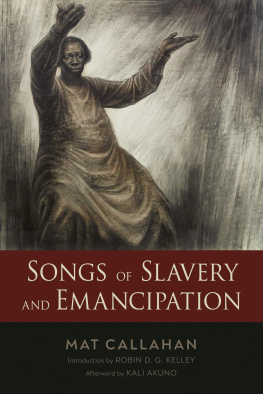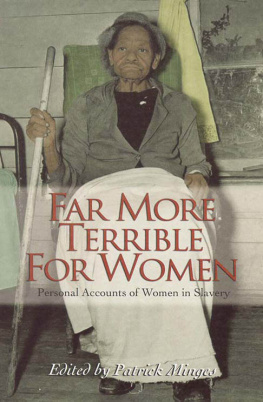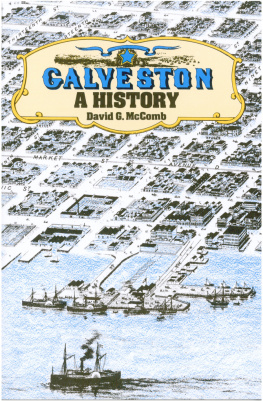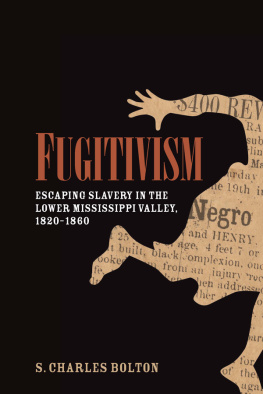ACKNOWLEDGMENTS
It is hard to remember all the people who have helped shape the stories in this book. When you work on a project for over a decade, your memory about some of the specifics tends to fade. If you consider that many people played a role even before I first thought about writing a history of slavery and freedom in Texas, the task becomes even harder. With that in mind, I would like to thank Adrienne Davis first. Adrienne was my professor in law school, and she has provided encouragement, advice, and guidance at just about every step in my career. If not for her, I doubt that I would be writing this today. William Terry Fisher and Kenneth Mack also deserve early recognition. They were my advisors at Harvard while I worked on my LLM, and they showed me how to be a legal historian, teaching me about substantive areas and various methodologies while they supervised my work. I would also like to thank Ariela Gross. I reached out to Ariela years ago, and we have remained in contact ever since. Her approach to writing about race has always inspired me, delving into local records to upend traditional assumptions, and I continue to draw on her advice, mentorship, and support.
My interest in Texass history started when I took my first tenure-track job at Texas Wesleyan (now Texas A&M) Law School. Before then, I had not spent much time in Texas except to visit my wifes family. The longer we lived there, however, the more intrigued I became with how Texas seemed to be both a real and an imagined place, the sum of the many stories people told about it. As I started to dig into these stories, my law school provided me with summer grants, travel money, and research assistance. During that time, Constance Mims, one of my research assistants, helped immensely, trekking about locally to find various sources, as well as drafting memos that I still rely on today. My colleagues from that time were wonderful. Stephen Alton, Susan Ayers, Michael Green, Keith Hirokawa, Earl Marty Martin, Huyen Pham, Susan Phillips, and Aric Short are a few of the people on the current or former faculty who read drafts of early articles and offered support.
I have since accepted a position at Gonzaga Law School and moved to Spokane, Washington. Despite my new location, my interest in the history of Texas continued unabated. Fortunately, Gonzaga recognized the worth of my project and supported me as I tried to uncover the lost stories of the people in the book. My former dean George Critchlow and my current dean Jane Korn provided funds for travel, research, and conferences, for which I am deeply grateful. Sean Harkins, Paige Holly, Morgan Napieralski, Katherine Naulty, and Jacob Stillwell are among the research assistants who located obscure sources and helped with citations. They are among those deserving thanks. A number of my current and former colleagues, especially Patrick Charles, Mark DeForrest, Gerry Hess, Brooks Holland, Kim Pearson, Kevin Michels, and Mary Pat Treuthart, also deserve my gratitude. They read drafts and offered assistance and suggestions at various points along this journey.
In traveling the state of Texas in search of materials, I have encountered so many people willing to help that I cannot possibly name them all, so Ill settle on acknowledging their support by mentioning the places in which they work. In Fort Worth, I am grateful for the help at the Amon Carter Museum, where the staff let me arrive early and stay late to scroll through the microfilm of newspapers before they were digitized and made available on the Portal to Texas History. In Waco, I want to thank the staff at the McLennan County Courthouse, as well as the librarians at Baylor Law School, for helping me recover the story from the introduction and the conclusion. In Wharton, I want to thank the staff at the Wharton County Courthouse and the Courthouse Annex for patiently listening to my questions and helping me to locate many of the sources in . I am also grateful to the employees at the Wharton County Historical Museum. I am especially appreciative of that moment after I said I was writing about John C. Clark, and the staff member pointed to Johns powder horn prominently displayed in the museum, illustrating for me how real the story had become. The staff there also put me in touch with George Bud Northington, a descendant of the Heard and Northington families of Wharton County, including W. J. E. Heard, who bought his property from John Clark long ago. Bud sent me information about the family and showed me a restored home on his property that helped me visualize the cabin in which John Clark and Sobrina lived. Finally, I am grateful that Barbara Byersa descendant of F. Gray Franks, who represented the children in the dispute over John Clarks estatecontacted me. Barbara pointed me in the direction of a number of sources that helped me appreciate the role Franks played.
I would also like to thank the staff at the East Texas Research Center, located at Stephen F. Austin University in Nacogdoches. They were incredibly helpful as I sought to reconstruct the story in from slaves in Texas, had welcomed me into their home. My in-laws Keith and Alice, my new sister Kim, my new uncles and aunts, my new cousins, and my new grandparents graciously accepted me in their lives. The memory of my wifes grandmother carrying around that old, tattered copy of my first law review article to show her friends at church is enough to make this whole project worth it.
The people who helped reconstruct the story in are also too numerous to name. I received assistance from the staff at the Jefferson County Courthouse, as well as at the Tyrrell Historical Library, in Beaumont. Several miles away in Orange, the staff at the Orange County Courthouse also helped me navigate the old record books. The same is true of the people at the Sam Houston Regional Library and Research Center in Liberty, where a lot of the old case files, tax records, and minute books from Jefferson and Orange Counties can be found. The story of the Ashworths is a very personal one for the descendants of the family, many of whom still live in the area. A number of the family members have reached out to me over the years after reading an early article Id written about the family or after hearing about my current project. I regret that I will not be able to name all those I have spoken to, but I would like to mention Sharon Jarrell, Verna Thompson, Rachel Stinson, and Ken Williams. These descendants and others have shared pieces of information about the family with me, pointed out a few of my errors, and, without exception, shown deep appreciation for my efforts to bring their remarkable familys story to light.
I am also grateful for the help excavating the story in . I spent time in the Dolph Briscoe Center for American History at the University of Texas in Austin, as well as in the Rosenberg Library in Galveston, reading through William Pitt Ballingers diary and his papers, along with other, more obscure sources. The professionals in both libraries were exceptional and deeply knowledgeable. I also would like to thank the staff at the Galveston County Courthouse.
Finally, I would like to recognize the staff at the Texas General Land Office and at the Texas State Library and Archives Commission, both in Austin. There I found critical pieces of each story, and I am grateful for the insight and patience of the many people who helped explain sources and steer me in the right direction.
A number of my friends and colleagues have read drafts, offered suggestions, and provided support. I am especially grateful to Daniel Sharfstein. Dan, one of the best writers I know, read every page of my manuscript, and his comments unquestionably made the final product better. Dan also brought me to Vanderbilt University to present my work at the Circum-Atlantic Studies Seminar, headed by the inestimable Jane Landers. Jane and her colleagues were incredibly gracious, and while their imprint is most noticeable in the introduction, it can also be felt elsewhere in the book. Another close colleague who provided immeasurable support is Alfred Brophy. Several times Al encouraged me to keep going, reminding me of the possibilities and potential of my project. He offered advice, suggestions, and good cheer. I would also like to thank Randolph Mike Campbell. Mike, whose knowledge of Texas history is unmatched, has read versions of a number of the stories in the book and has provided welcome feedback.







